(完整版)用适当形式填空解题技巧及练习
幼儿园语文适当形式填空答题技巧
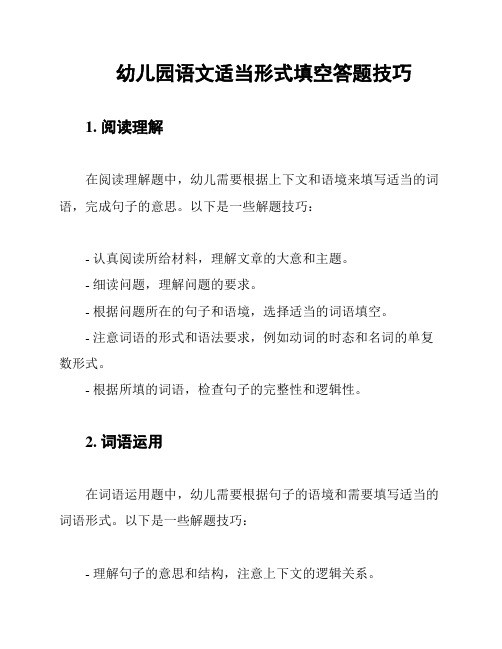
幼儿园语文适当形式填空答题技巧
1. 阅读理解
在阅读理解题中,幼儿需要根据上下文和语境来填写适当的词语,完成句子的意思。
以下是一些解题技巧:
- 认真阅读所给材料,理解文章的大意和主题。
- 细读问题,理解问题的要求。
- 根据问题所在的句子和语境,选择适当的词语填空。
- 注意词语的形式和语法要求,例如动词的时态和名词的单复数形式。
- 根据所填的词语,检查句子的完整性和逻辑性。
2. 词语运用
在词语运用题中,幼儿需要根据句子的语境和需要填写适当的词语形式。
以下是一些解题技巧:
- 理解句子的意思和结构,注意上下文的逻辑关系。
- 根据句子中的提示和要求,选择适当的词语填空。
- 注意词语的语法要求,例如动词的时态和人称,形容词和副词的级别等。
- 根据所填的词语,检查句子的完整性和语义的准确性。
3. 表达能力
适当形式填空题目也是培养孩子语言表达能力的一种方式。
以下是一些提高表达能力的技巧:
- 多读多写,积累词汇和语言表达的方式。
- 研究语法知识,掌握词语的形态和用法。
- 练解答适当形式填空题,增加对句子结构和语境的理解。
- 注意语言的准确性和连贯性,尽量避免语法错误和表达不清的问题。
通过合理运用上述技巧,幼儿可以在语文适当形式填空答题中获得更好的成绩,提高语言能力和表达能力。
同时,老师和家长应该给予孩子足够的练和指导,帮助他们逐步提高解答这种题型的能力。
以上就是关于幼儿园语文适当形式填空答题技巧的一些建议。
希望对您有所帮助!。
适当形式填空全解及练习(附答案)

用所给词的适当形式填空一、单复数1、名词单复数I like bananas (banana) very much. That is an apple (apple).2、be动词单复数(这里要注意过去时,不要忘记看后面的时态)There is (be) a pair of shoes under the bed. Here is (be) some water for you.I am (be) very glad to see you. Tom and I are (be) in the same class.Where were (be) you just now? I was (be) in the playground.3、代词单复数These(this) are rulers. Liu Tao is doing his(their) homework.二、名词所有格(This is Helen’s (Helen) scarf. Happy Children’s(children) Day.三、人称代词和物主代词1.人称代词—主格(在句中作主语,述句中一般在开头,一般疑问句中一般是第二个单词……)We(our) milked cows on the farm yesterday. Does she(her) have a new bike?Which pen do you(your) like? On Christmas Day I(my) gotmany presents.2.人称代词—宾格(在句中作宾语,一般用在动词或介词后)Let me(mine) have a look. David is behind her(she). 3.物主代词—形容词性(用在名词前)What is your(you) job? Miss Li is their(them) English teacher.4.物主代词—名词性(相当于“形容词性物主代词+名词”)The teapot is his(he). Yours(your) is over there.四、基数词和序数词1.基数词表示数量 There are five(fifth) birds in the tree. 2.序数词表示顺序 March is the third(three) month in a year. 常见序数词 first second third (不要拼错了,学作文时也可以用)五、动词—时态(时态也是一个非常重要的一点,一定要在考试时注意。
幼儿园数学适当形式填空答题技巧

幼儿园数学适当形式填空答题技巧
填空题是数学中常见的一种题型,对学生的计算能力、逻辑思
维能力有一定的考验。
为了帮助幼儿园的孩子更好地理解和解答填
空题,我们提出以下适当填空答题技巧:
抓住关键词
填空题最重要的是抓住关键词,关键词包括两种:一是题目中
问的是什么,二是题目中提供的已知条件。
要想做好填空题,就要
先认真阅读题目,找出关键词,然后着重理解它们。
审题保持细心
在填空题中,要防止因粗心导致错过题目中的细节,或者理解
题目有误,导致填错答案。
要提醒学生,审题时一定要仔细、细心,避免因疏忽而失分。
列式解题
对于复杂的填空题,可以通过列式解题来梳理思路,直观地看
出各个步骤和变量之间的关系,从而更好地解答填空题。
反复练
要想在填空题中取得好成绩,首先要有充足的练。
只有反复练,才能熟练掌握填空题的解答技巧,并且锻炼自己的逻辑思维能力和
计算能力。
总结归纳
在学生完成填空题的过程中,老师应该及时对解答过程和答案
的正确性进行检查和总结,在完成一套题目后,还应该对填空的技
巧进行总结归纳,及时纠正和改进学生的不足之处。
通过上述适当填空答题技巧的运用,相信幼儿园的孩子们在填
空题解答方面也会有所提高。
六年级上册英语适当形式填空技巧
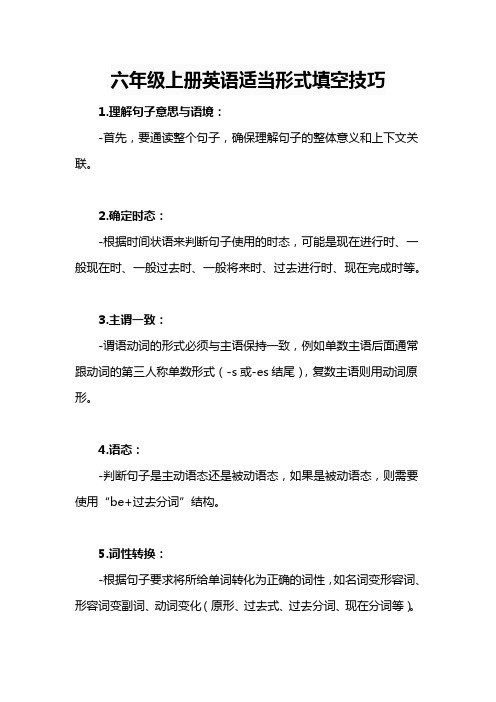
六年级上册英语适当形式填空技巧
1.理解句子意思与语境:
-首先,要通读整个句子,确保理解句子的整体意义和上下文关联。
2.确定时态:
-根据时间状语来判断句子使用的时态,可能是现在进行时、一般现在时、一般过去时、一般将来时、过去进行时、现在完成时等。
3.主谓一致:
-谓语动词的形式必须与主语保持一致,例如单数主语后面通常跟动词的第三人称单数形式(-s或-es结尾),复数主语则用动词原形。
4.语态:
-判断句子是主动语态还是被动语态,如果是被动语态,则需要使用“be+过去分词”结构。
5.词性转换:
-根据句子要求将所给单词转化为正确的词性,如名词变形容词、形容词变副词、动词变化(原形、过去式、过去分词、现在分词等)。
6.固定搭配与短语:
-注意记忆和运用常见的动词与介词搭配、形容词与名词搭配等固定表达方式。
7.检查语法结构:
-确保填入的词汇符合句中相应的语法结构,如定冠词、不定冠词、代词的正确使用等。
8.分析选项:
-对于给出的选择项,对比每个选项,结合上述所有规则,选择最符合语法规则和语境的那个答案。
七年级所给词的适当形式填空技巧全解及练习题(含答案)
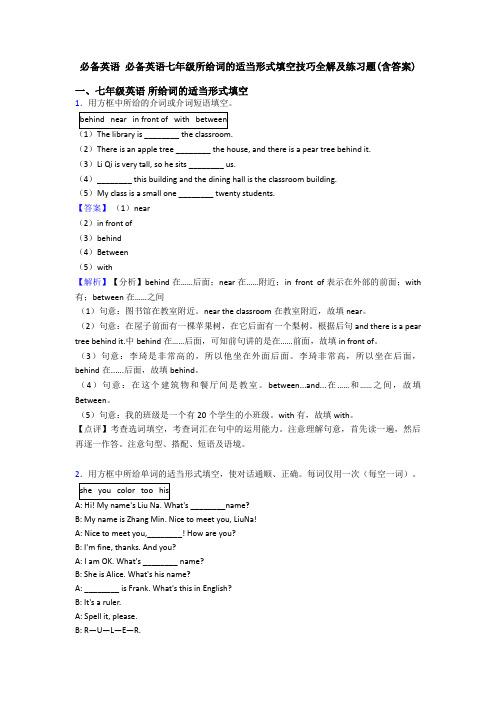
必备英语必备英语七年级所给词的适当形式填空技巧全解及练习题(含答案)一、七年级英语所给词的适当形式填空1.用方框中所给的介词或介词短语填空。
(2)There is an apple tree ________ the house, and there is a pear tree behind it.(3)Li Qi is very tall, so he sits ________ us.(4)________ this building and the dining hall is the classroom building.(5)My class is a small one ________ twenty students.【答案】(1)near(2)in front of(3)behind(4)Between(5)with【解析】【分析】behind在……后面;near在……附近;in front of表示在外部的前面;with 有;between在……之间(1)句意:图书馆在教室附近。
near the classroom在教室附近,故填near。
(2)句意:在屋子前面有一棵苹果树,在它后面有一个梨树。
根据后句and there is a pear tree behind it.中behind在……后面,可知前句讲的是在……前面,故填in front of。
(3)句意:李琦是非常高的,所以他坐在外面后面。
李琦非常高,所以坐在后面,behind在......后面,故填behind。
(4)句意:在这个建筑物和餐厅间是教室。
between...and...在……和……之间,故填Between。
(5)句意:我的班级是一个有20个学生的小班级。
with有,故填with。
【点评】考查选词填空,考查词汇在句中的运用能力。
注意理解句意,首先读一遍,然后再逐一作答。
注意句型、搭配、短语及语境。
2.用方框中所给单词的适当形式填空,使对话通顺、正确。
单词适当形式填空解题步骤及答题tips

单词适当形式填空解题步骤答题技巧一:词性分类出题者的目的就是让考生能够进行词性分类。
名、动、形、副的顺序可以根据考生的习惯排序。
此处建议给学生讲解词根,前缀及后缀的知识。
答题技巧二:瞻前顾后这里提到的瞻前顾后就是需要考生根据空格的前后来决定所填词的词性,我们可以根据一些简单的语法知识确定答案。
应该说语法知识是解词汇理解题的基础。
1. 确定空格为名词(1)a /an/the n. , adj. n. , vt. n. , 即空格处前面为冠词、形容词或者及物动词的,空格处应填入名词;(2) n. v., 即空格处后面是动词的,空格处应填入该动词的主语(名词);(3)prep. n. , 即空格处前面是介词的,空格处充当介词宾语,用填入一个名词或动名词。
2. 确定空格为动词(1)n./pron. vt. n./pron., 即空格处前面已经有名词/代词作主语,后面又有名词/代词作为动词的宾语,空格处应为及物动词;(2)n./pron. vi. , 即空格处前面是名词/代词,后面没有宾语,空格处应填不及物动词;(3)n./pron. vi. adv./prep., 即空格处前面是名词/代词,空格处后面是副词/介词,空格处应填入不及物动词,与副词/介词构成固定搭配;(4)n./pron. link v./be. adj., 即空格处前面是名词/代词,后面是形容词,空格处应填入系动词或be动词;(5)to v. , 即空格处前有不定式标志to,空格处应填入动词原形;另一种情况to是介词,后面应填入动名词。
3. 确定空格为形容词(1) adj. n. 或n. adj. , 即空格处前面或者后面为名词的,空格处应填入形容词;(2)adv. adj. , 即空格处前面是副词的,空格处应填入形容词;(3)link/be v. adj. , 即空格处前面是系动词或be动词的,空格处应填入形容词作表语。
4. 确定空格为副词(1) adv. v. 或v. adv. , 即空格处前面或者后面为动词的,空格处应填入副词;(2) adv. adj. , 即空格处后面是形容词的,空格处应填入副词。
【初中英语】七年级所给词的适当形式填空技巧(很有用)及练习题
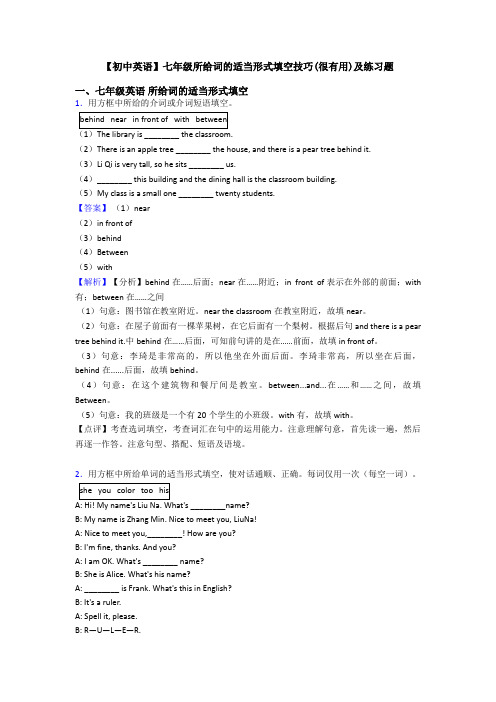
【初中英语】七年级所给词的适当形式填空技巧(很有用)及练习题一、七年级英语所给词的适当形式填空1.用方框中所给的介词或介词短语填空。
(2)There is an apple tree ________ the house, and there is a pear tree behind it.(3)Li Qi is very tall, so he sits ________ us.(4)________ this building and the dining hall is the classroom building.(5)My class is a small one ________ twenty students.【答案】(1)near(2)in front of(3)behind(4)Between(5)with【解析】【分析】behind在……后面;near在……附近;in front of表示在外部的前面;with 有;between在……之间(1)句意:图书馆在教室附近。
near the classroom在教室附近,故填near。
(2)句意:在屋子前面有一棵苹果树,在它后面有一个梨树。
根据后句and there is a pear tree behind it.中behind在……后面,可知前句讲的是在……前面,故填in front of。
(3)句意:李琦是非常高的,所以他坐在外面后面。
李琦非常高,所以坐在后面,behind在......后面,故填behind。
(4)句意:在这个建筑物和餐厅间是教室。
between...and...在……和……之间,故填Between。
(5)句意:我的班级是一个有20个学生的小班级。
with有,故填with。
【点评】考查选词填空,考查词汇在句中的运用能力。
注意理解句意,首先读一遍,然后再逐一作答。
注意句型、搭配、短语及语境。
2.用方框中所给单词的适当形式填空,使对话通顺、正确。
用所给词的适当形式填空做题策略与技巧
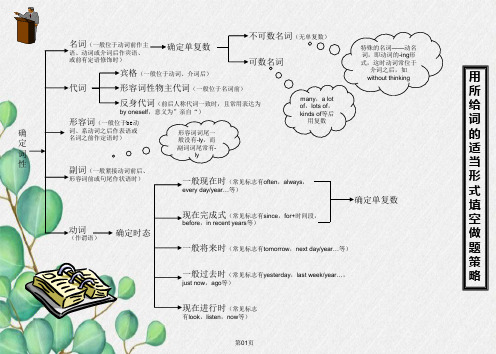
动词形式
同根反义词 (词性与粗体 对应)
unimportant
successfully carefully
succeed care
heavily terribly
happily
like use
harm
unfriendly dislike useless
unhappy
第02页
用 所 给 词 的 适 当 形 式 填 空 做 题 策 略
friend
important different kind natural successful careful friendly
harm happiness difficulty
useful heavy terrible harmful happy difficult
副词形式
importantly differently
略
just now,ago等)
现在进行时(常见标志
有look,listen,now等)
第01页
一、常见考词汇总
汉语词义 名词形式 形容词形式
重要 不同 善良 自然 成功 细心 友好 喜欢 有用 重 严重 伤害 高兴 困难
importance difference kindness nature success
many,a lot of,lots of,
给
by oneself,意义为”亲自“)
形容词(一般位于be动
kinds of等后 用复数
词
确
词、系动词之后作表语或
形容词词尾一
定
名词之前作定语时)
词
般没有-ly,而 副词词尾常有-
ly
性
副词(一般紧接动词前后、
- 1、下载文档前请自行甄别文档内容的完整性,平台不提供额外的编辑、内容补充、找答案等附加服务。
- 2、"仅部分预览"的文档,不可在线预览部分如存在完整性等问题,可反馈申请退款(可完整预览的文档不适用该条件!)。
- 3、如文档侵犯您的权益,请联系客服反馈,我们会尽快为您处理(人工客服工作时间:9:00-18:30)。
关于“用适当形式填空”各题型汇总及练习1. 动词(包括be动词,助动词,和实义动词):特指动词变化与时态相关的情况1)Listen, the birds ___________ (sing) in the tree.2)The room is dirty. What ______ you ______ (do) just now?3)______ Miss Li ______ (have) a long holiday?4)My mother usually ______ (cook) at 5 o'clock.5)_______ Helen like _______ (swim)?Yes, she ______. Look, she __________ (swim) now.6)______ ( do not ) kick the ball.7) That girl can ______ (sing) French songs.8) I often _____to school at seven every morning. My sister often ______ to school with me. I________to school now. But I ______ to school late yesterday. (go)9) My younger brother ________ a lot of ice-cream last night. So he can't______anything today. The doctor says to him: 'Don't______too much.' So he ______a little today. (eat)10) Last week, I ______ a Beijing opera show. It was interesting. I am _________________ it again next week. (see)2. 数词:考虑基数词--- 序数词的转化1)It's the ______ of May. There are _______ students in the playground. (twelve)2)Miss Li lives on the _______ (two) floor in this building.3. 人称代词类:考虑主格,宾格,形容词性物主代词,名词性物主代词,反身代词1)I have a beautiful cat. _______name is Mimi. These cakes are ________. ( it )2)Shall ______ have a look at that classroom? That is ______ classroom. ( we )3)_______ is my aunt. Do you know _______ job? _______a nurse. ( she )4)Don't worry. I can do it by __________. (I)5)I have a lovely brother. _______ is only 3. I like ________ very much. ( he )6)May I sit beside _________? ( you )7)_______ (who) comb is this? It's ______ (she), I think.4. 名词: 考虑名词单复数情况1)Many ______ (child) like ice creams.2)These _______ (people) are looking at the moon now.3)Ma Ming wants to take some _______ (photo).5. 表示国家:考虑国家、语言、人种:1)That girl can ______ (sing) French songs.2)Yang Ling is a _______ (China) girl.3)Jim is from _______. He speaks ________. (France)4)Jack is from _______. He speaks ________. (German)6. 形容词、副词的比较级、最高级:(详见比较级、最高级专项练习)7. 动词、名词、形容词、副词之间的相互转化:(此处指动词变化与时态无关的情况)1)动词、形容词的转化a. 词尾加ful:use - useful, care - careful, help - helpful, thank - thankful, peace - peaceful, forget - forgetful, play - playful, succeed - successful, wonder - wonderfulb. 词尾加d /ed:please - pleased, unite - united, excite - excited, surprise - surprised, use - used, organize - organized, close - closed, relax - relaxed, develop - developed, appreciate - appreciated , frustrate - frustrated, interest - interested, annoy - annoyed, frighten - frightened, crowd - crowded, pollute - pollutedc. 词尾加ing:interest - interesting, surprise - surprising, excite - exciting, develop - developing, frighten - frightening, thrill - thrilling, frustrate - frustrating, relax _ relaxing, live - living, rock - rocking, sleep - sleepingd.词尾变y为i,加ed:worry - worried, marry - married, fry - fried, terrify - terrified, satisfy - satisfiede.词尾加able:know - knowledgeable, enjoy - enjoyabe, suit - suitable, adjust - adjustable, comfort - comfortable, believe - believablef. 词尾加less:care-careless, use-useless, hope-hopelessg. 词尾加ive / aive:create-creative, attract-attractive, act-active, talk-talkative, correct - correctiveh. 其它:lose - lost, fool - foolish, live - lively / alive /living, sleep - sleepy / sleeping / asleep, wake - awake, taste - tasty,speak - spoken, break - broken, die - dead, educate - educational, world - worldwide,imagine---imaginary ……2)动词、名词的转化:a. 词尾+mentmove-movement,agree-agreement,govern-government,manage-management,equip-equipment,argue-argumentb. 词尾+tion/cion/sion:decide-decision, educate-education, dictate-dictation, graduate-graduation, invent-invention,invite-invitation, pollute-pollution, compete, competition, instruct-instruction, conclude-conclusion, express-expression, satisfy-satisfaction, produce-productionc. 词尾+ingswim-swimming, bath-bathing, build-building, learn-learning, write-writingd. 词尾-er/ar/ist/ess (表示职业和身份):beg-beggar,act-actor,act-actress, teach-teacher, educate-educator, cook-cooker, wash-washer, e. 词尾-ice;serve-service, note-notice,f. 其他:press-pressure,sit-seat, fly-flight, heat-heat, mix-mixture, ……1) This dictionary is ____________ (help).2) The girls likes ___________ (sit) quietly.3) He is a ____________ (succeed) actor.4) Please read the __________ (note) carefully before writing your answer.5) There is a ___________ (beg) under the bridge.3)名词、形容词的转化:a. 结尾+y:health-healthy, cloud-cloudy, rain-rainy, luck-lucky, sun-sunny, noise-noisy, ice-icy, shine-shiny , silk-silky, fur-furry, taste-tastyb. 结尾+ed:spot-spotted, talent-talented, balance-balanced,c. 结尾-ly: (注意区分ly结尾的副词)friend-friendly, love-lovely, live-lovelyd. 结尾-ce改-t:difference-different, silence-silent, confidence-confidente. 结尾-ous:danger-dangerous, mystery-mysterious,f. 结尾-al:music-musical, medicine-medical, nature-natural, tradition-traditional, origin-original , person-personal, g. 结尾-less/ful:home-homeless, hope-hopeless, beauty-beautiful, meaning-meaningful , color-colorful, pain-painful, thank-thankfulh. 结尾-able:value-valuable, adjust-adjustable, suit-suitable, knowledge-knowledgeable, comfort-comfortablei. 结尾-en:wood-wooden, wool-woolenj. 其他……fool-foolish, freedom-free, love-loving, death-dead, pleasure-pleasant, popularity-popular, pride-proud, scientist-scientific, energy-energetic, height-high4)形容词、副词的转化:结尾-ly:careful-carefully, lucky-luckily, heavy-heavily, happy-happily, angry-angrily, sudden-suddenly, absolute-absolutely, true-truly, wide-widely, useful-usefully,possible-possibly8. 一词多词性及其他特殊情况:1)动词、名词同形(意义不同):book, seat, water, shoulder2)形容词、副词同形:fast, right, late, last, hard, well, straight, high, pretty, tight, short1) That is a very _______ train. It goes very ________. (fast)2) He is a _________ worker. He works ________. (hard)3) It is a _________ road. It runs __________ for miles. (straight)4) She is a ___________ girl. That is a __________ good picture. (pretty)5) I'm afraid he is not ________. He can sing __________. (well)3)以下词加-ly, 意义完全不同,并非是词性之间的相互转化:early, far, fast, hard, high, late, often, past, right, soon例句:1) He came late. I haven't seen him lately.2) The team played fair. He did fairly well in his examination.3) My grandparents live quite near. I nearly made a mistake.4) We had to work hard. They could hardly find their way.5) The boy climbed high up the tree. She is highly interested in history.6) He studied deep into the night. He is deeply grateful for our support.7) The car stopped short at the gate. (in an abrupt way; suddenly)He will come shortly (= soon).8) Please be back at 6 o'clock sharp. The father spoke sharply to the boy.9) You guessed wrong. He was wrongly accused of the crime。
